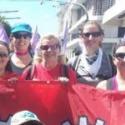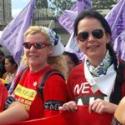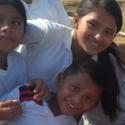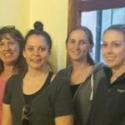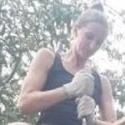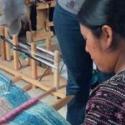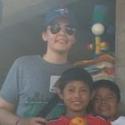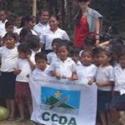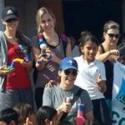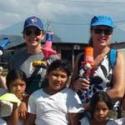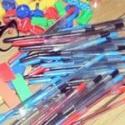In March 2015, Stephanie Vandewater (CIU/Calgary) was selected to participate in the Education in Action project, sponsored by PSAC's Social Justice Fund. She kept a journal of her experiences to share with other members. We've posted that below, along with a selection of photos from the trip.
Kristy Munns (Agriculture/Lethbridge) also participated on this trip and kept an ongoing log of her experiences via the Twitter account @activist_abroad. Read more about her experience and see photos on her Twitter feed (no account required).
We're not in Kansas anymore
The first week in Guatemala felt long and was emotional. Our group of seven women, from across Canada, met for the first time on March 6 at the Toronto Airport and from there made the journey to Guatemala City. After a long day's travel, I made it into the country without a single word from the customs agent but I did notice there were heavily armed guards standing around the baggage carousel. We met our driver who took us to our gated hotel, where we had to buzz to be let in and were promptly shuffled from the van inside.
In the morning we wandered around the capital to find a bank and noticed there were many people out and about. There were also armed men at various locations on the street standing guard. At the bank, we were allowed to enter by an armed security guard. Once inside I noticed that the door was locked behind each person and that the guard only opened it after seeing who was outside. Men with jackets were frisked and those with bags were checked.
Already I could tell that things here were much different than they would be at home. There were children on the street juggling and people carrying goods to sell like peanuts, fruit and clothing. While sitting on a bench, one woman in our group had her phone stolen right out of her hands. It wasn't a great start to the trip but it made us all quickly realize that it is not safe here and we were to stick together and keep our items close.
Meeting the inspirational change makers
In the afternoon we met with Yuri Melini, the founder of CALAS – the Center for Socio Environmental and Legal Action. CALAS receives funding from the PSAC Social Justice Fund to help support their work. He gave a presentation on what the organization does, and we learned that they do many things to help citizens of Guatemala. Specifically, they deal with land disputes and the practices of mining companies. When the first mine came here 13 years ago, no one knew what a mine was nor how it would impact them. Now there is an understanding of the issues and communities are working to protect and defend their land. Yuri was shot seven times in 2008 because he was helping concerned communities speak out against mining. As 96 per cent of cases never result in any persecution, the shooter was never found. Yuri has still not given up his battle to defend the communities and is planning on running for political office.
March 8 was International Women’s Day. We all got dressed up in our PSAC gear and marched the streets of the capital city along with women from the CCDA (Campesino Committee of the Highlands) who had travelled three hours by bus to participate. Although we couldn’t understand some of the chants, it felt great to march in solidarity with other women from the country.
The next day when we arrived in Quixayá we were given a presentation from Leocadio Juracán who is the head of the CCDA. This organization was formed 33 years ago, and currently works with over a thousand communities across Guatemala. They are a grassroots organization that defends workers’ rights and assists with land access cases. Guatemala is a country marred by corruption and exploitation. Most of the country’s wealth and land is concentrated in the hands of very few. The CCDA’s vision is not only about getting indigenous people their land back, but teaching them to grow and produce goods for themselves and others. They also offer free workshops and training to their members. The sale of organic fair trade coffee has helped raise awareness of their struggle for justice. It is sold in Canada as Café Justicia and can be purchased at by emailing Janet St-Jean from PSAC's Social Justice Fund.
During the first week we also met with a group of women weavers from “A Thread of Hope”. They are a cooperative of 170 women who produce beautiful handmade and hand dyed products. It started 25 years ago with help from a Canadian man who assisted a group of widowers to get the business off the ground. It takes around 10 hours to make a scarf and another day to do the fringe work. The scarf is then sold for $25. The women are paid per piece but still earn a fair wage. Even though they were very busy, they took the time to give us a tour and explain their operation.
Walking the walk
The second week started off with some hard labour. We moved 350 cinder blocks and bags of concrete to the site where they were preparing to build the first high school in Quixayá. We also visited two different school sites. The first school was in Nuevo Amanecer, where the community is just starting to rebuild after being evicted from their homes two years ago. They are still waiting for the government to finish construction and provide them running water. The other school was in El Esfuerzo, where Education in Action helps to pay the salary of a teacher. Despite not having much, the children were very friendly and tried their best to speak to us in English.
We also visited the community of Nuevo Providencia which was devastated by tropical storm Agatha in 2010. A group of women in the community have started a tilapia farm (with help from the CCDA). We visited another tilapia farm, which was walking distance from Quixayá, where we stayed. The land belongs to one woman who shares it with the others for this project. This group feeds the fish twice a day and they have a few different ponds that houses fish of various sizes and snails. Each family receives one fish a week and they also have various fruit and vegetables growing. The grounds around the ponds are like paradise with beautiful flowers and well-manicured landscaping.
We participated in a market activity in San Lucas where we were given the equivalent of $4 CAD to feed our “family” of nine for the day. This amount was slightly higher than the local average. There is a minimum wage, but people are not always paid that standard. With our $4, we were able to buy a small watermelon, a small bag of corn, a bag of rice, a bag of beans, four potatoes, two large carrots, a pepper and a bunch of onions. Hardly enough to feed two people comfortably, let alone nine.
The struggle continues
On our last day, we took a trip to San Rafael Las Flores to meet with community members who are opposed to mining. Tahoe Resources, a Canadian mining company, built a mine just outside of their community and is responsible for many of their heartaches. The communities surrounding the mine almost all voted against it, but the vote was non-binding. Seven people were shot at a peaceful protest outside the mine in 2013. There is fear of water contamination and damage to agriculture, which is the biggest local industry. The mine is also dividing families as it employs some locals, but 99 per cent of the profits leave Guatemala.
Despite the lack clean water, hot showers and other comforts of home, I discovered the resilience of the people of Guatemala to be inspiring and the trip overall to be very eye opening and something I will never forget.
For more information on how you can get involved in Education In Action and to purchase Café Justicia, please contact the PSAC Social Justice Fun at 613-560-2974 or email Janet St-Jean.

